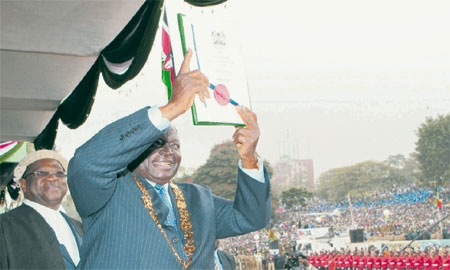Widely regarded as marking a national rebirth, Kenya’s new constitution was promulgated on August 27 last year, following overwhelming public backing for it in a referendum.
The new constitution is intended to deepen democracy, strengthen the rule of law and expand economic opportunity for all Kenyans. It is also expected that by increasing confidence in the country at home and abroad it will pay dividends in terms of encouraging both domestic and foreign investment.
The need for new rules defining the relationship between the people and the Government was highlighted by post-election violence in 2007 and 2008 that left hundreds of casualties and thousands displaced from their homes.
The new constitution replaces one that had been in force since Kenya gained its independence from Great Britain in 1963. It has been hailed by President Obama as setting an example for the whole of Africa by demonstrating the commitment of Kenya’s leaders and people to a future of unity, democracy and equal justice for all. Crucially, it provides for reduced presidential powers, devolved government and a new judiciary.
Ambassador Amina Chawahir Mohamed Hossain, Permanent Secretary at the Ministry of Justice, National Cohesion and Constitutional Affairs, says the new constitution “changes absolutely everything” by giving power back to the people and making the Government more locally responsive.
“As soon as you are able to establish government at the county level and devolve resources and share them out in a manner that allows for the expansion of opportunities for job creation and for small businesses, the Government will be able to provide the services that are so critical for people, such as the provision of basic infrastructure, health and education,” she says.
Up to now most investment has been targeted at major industries based in Nairobi or Mombasa. Ms Mohamed believes that under the new constitution, investment will spread all over the country. “I really hope that the counties will start competing for investment by offering incentives to investors, just as it happens in many countries,” she says.
By bringing development, job creation, better infrastructure and education facilities to all areas, it is hoped to stem the movement of people from rural to urban communities. The Ambassador says, “If you can get that in all the counties, then you will not have huge migration from rural areas to urban centres and a growth in slum areas.”
Services will be delivered where people live. She adds, “For the first time, people in the rural areas will not have to travel extremely long distances to seek their rights, which is fundamental.”
Ms Mohamed says the new constitution will improve Kenya’s credibility as a destination for foreign investment. “If you reform your judiciary, people will have confidence that any issues or disputes that arise will be dealt with quickly, fairly and objectively, and they will be more willing to come in.”
It is hoped that substantial progress will have been made in passing the 49 new laws required to bring the constitution into force by the time President Mwai Kibaki hands over power in 2012 after serving his maximum term in office. A constitution implementation commission was sworn into office in January and has acknowledged the sense of urgency required. Its chairman, Charles Nyachae, has said that the greatest legacy the commission could leave the country would be to fully implement the constitution within the commission’s five-year lifespan.
Ms Mohamed believes the new constitution will spur the country’s economic development. “Kenya has a lot of potential, and we need to unleash it,” she says. “I think that the constitution does this for us. Almost 65 per cent of our population is classed as young, which is huge. They are just looking for opportunities and a level playing field, as well as a sense of direction and support to be able to move on. The constitution is the catalyst we need.”

0 COMMENTS